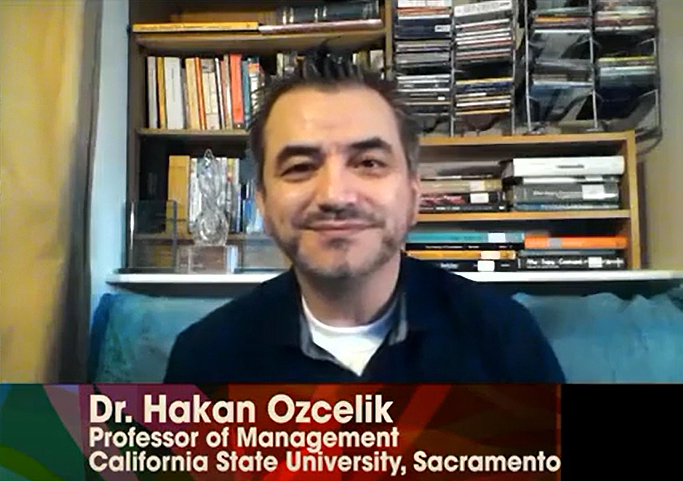
By Cynthia Hubert
Businesses around the globe should prepare for potentially profound and lasting changes in their employees, policies, and workplaces as a result of the ongoing COVID-19 pandemic, according to research by prominent international scholars including a Sacramento State professor.
The study, recently published in the journal American Psychologist, looks at the implications of COVID-19 for employers and their workers, and offers roadmaps for the future.
 Professor Hakan Ozcelik has been working to help people cope with work and educational realities caused by the COVID-19 pandemic. (Image courtesy of Hakan Ozcelik)
Professor Hakan Ozcelik has been working to help people cope with work and educational realities caused by the COVID-19 pandemic. (Image courtesy of Hakan Ozcelik)Hakan Ozcelik, a Sac State professor of Management who studies organizational behavior and emotions in the workplace, was among more than two dozen leading scholars from around the world who collaborated on the paper, which uses prior research and organizational psychology to examine how the pandemic has disrupted business practices and employees.
- COVID-19 and the Workplace: Implications, Issues, and Insights for Future Research and Action
- VIDEOS: CBA Organizational Wisdom Studio collection
The research suggests that the pandemic, which has forced many people to work from home since March, is spurring significant changes for employers as workers face increasing economic, social, psychological, and health risks. As the virus continues to take its toll, businesses will have to consider new leadership styles and teamwork approaches, and pay more attention to employee assistance programs that address mental health and substance abuse issues.
“It is obvious that COVID-19 will be recognized for changing the ways people work in fundamental ways,” the researchers write. “As many businesses around the world will be restructured and/or disappear due to the pandemic, the economic, social, psychological, and health costs of these actions are likely to be immense.”
Some groups of workers will be affected more dramatically than others based on their age, race or ethnicity, gender and other factors, the research notes. “An understanding of how these changes unfold is important for practitioners who are charting paths to address the needs of vulnerable categories of employees.”
Ozcelik has been closely following impacts of the pandemic and its effects on workers and business. He and Sacramento actress and producer Elisabeth Nunziato have produced a YouTube series titled CBA Organizational Wisdom Studio, which offers insights for educators and organizations dealing with isolation issues linked to the pandemic. Ozcelik also is conducting large-scale survey research on the effects of COVID-19 on loneliness, stress, and anxiety at work and on leadership.
“For the first few weeks of the pandemic, we were dealing with the shock and adjustments of having to work at home,” he said. “Now we can see that larger things are happening. Our working lives have been dramatically affected, and organizations all over the world are being impacted.”
“Organizations are really going to have to focus on strategies to create an equitable working environment for everyone.”
Ozcelik said the paper represents an effort to help businesses navigate fallout from the pandemic while identifying issues for future research.
"We could have gathered empirical data about this, but that would have taken several years to complete and publish,” he said. “Businesses need some guidance. We felt a responsibility to do something now.”
A recent survey of human resources departments found that half of all companies polled had directed 80 percent of their employees to work from home to help curb the spread of the virus. For many, especially those who live with others, blending personal and work space can be stressful.
“People are allocating their bedrooms for business meetings because they need to take care of work obligations,” Ozcelik said. “They’re sacrificing their personal space and personal relationships to get work done. I find that very concerning, and I think it’s something that human resources departments will have to address in the future.”
Previous research has focused on people who work from home by choice, the paper notes. Many of those workers prefer doing their jobs virtually and are more productive than they are in an office.
“But mandated working from home is quite different,” the researchers write in the American Psychologist paper. “How will changes such as these affect job satisfaction and productivity?”
Future research should look at how quarantines have affected job performance, including creativity and motivation, they say. Bosses will have to find new ways of communicating their vision and assessing the work habits and productivity of employees.
“There is ample reason to expect that new modes of surveillance will accompany various work-from-home arrangements,” the paper concludes. Video conferencing has become common, but “these virtual sight lines are fraught with risk, as they increase perceived stress and invade privacy.”
Ozcelik said he senses a growing “leadership crisis” fueled by uncertainty about how business will be conducted in the future. “No one knows how long this will last or what is going to happen next,” he said.
Based on research about different leadership styles, the paper proposes that a feminine style of leadership may be more effective in stressful times. Studies have described this leadership style as having more empathy, higher sensitivity to risk about health issues, and more attentive communication skills.
“It is plausible that a feminine style of leadership might become recognized as optimal for dealing with crises in the future,” the paper says.
The pandemic already is taking a toll on employees psychologically, socially, and economically, whether they were laid off, deemed “essential” workers who risked their health to go to workplaces, or were forced to work from home. Higher levels of stress and anxiety, weight gain, and increased alcohol use, among other consequences, have been documented.
Loneliness and a loss of physical connections have been linked to a variety of issues, including substance abuse, a decrease in productivity, and reduced job satisfaction.
“As organizations look ahead, prior research recommends that workplace loneliness be acknowledged and addressed” in human resources policies, programs, and practices, the paper says.
Once the immediate threat subsides and more people return to offices, mandates such as physical distancing, wearing face coverings, and avoiding touching others “are likely to have side effects that include at least some degree of harm” to mental health, according to the paper. Because the pandemic hit certain ethnic groups especially hard, some employees may feel a growing sense of inequality that could bring conflict to the workplace.
“Organizations are really going to have to focus on strategies to create an equitable working environment for everyone,” Ozcelik said.
As businesses become more globally integrated, infectious disease threats such as COVID-19 “need to be recognized as part of the work-scape,” the paper concludes. “To continue to reap the benefits from global cooperation, it will be necessary to find smarter and safer ways of working together.”
The lead researchers for the American Psychologist article are Kevin M. Kniffin of Cornell University, Jaynath Narayanan of the National University of Singapore, and Mark van Vugt from Vrije Universiteit Amsterdam. Scientists from Stanford University, the University of New South Wales Sydney, the London Business School, and Harvard University also contributed, among many others.